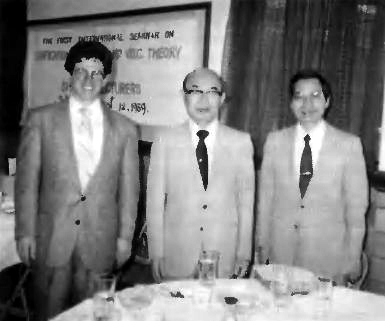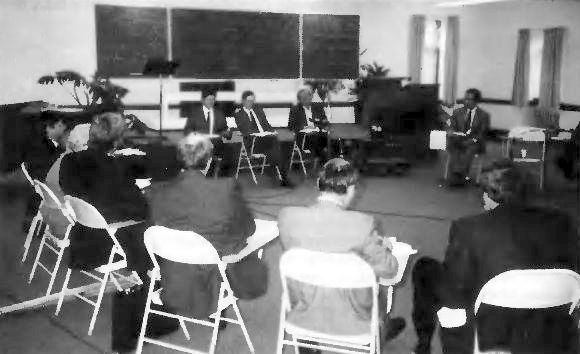![]()
The Words of the Perry Family
|
|
The Words of the Perry Family |

After
the 1989 summer seminar in Barrytown from left to right: Mr. Paul
Perry, Dr. Sang Hun Lee and Dr. Takeshi Furuta.
The American revival of Unification Thought took one more step forward on the weekend of November 11-12, 1989, with the Third Unification Thought Seminar in Barrytown, New York. Sponsored by Dr. David S. C. Kim, President of the Unification Theological Seminary, this program was designed primarily, but not exclusively, for the Unificationist scholars who did not take part in the 21-day seminar conducted by Dr. Sang Hun Lee in 1989. The purpose of this seminar was to review some aspects of the new materials introduced by Dr. Lee in the summer. The seminar was organized by Dr. Theodore Shimmyo and moderated by Mr. Paul Perry.
It was clear from the beginning that this seminar was at a different level from the two previous ones. The difference in part was due to our own maturation over the period of several months, but primarily it was due to the tremendous advancement in the theory of Unification Thought attained during the 1989 Summer Seminar conducted by Dr. Sang Hun Lee. Not only was our perception of the material greatly expanded, but also, and most importantly, we had achieved a greater level of unity of heart, undoubtedly from the experience of having met Dr. Lee personally. Unification Thought had touched our hearts in a very deep way, and our determination and seriousness to learn it was greatly strengthened.
The program consisted of papers and lecture presentations followed by discussions. Dr. John Sonneborne presented a lecture titled "Special Features of the Theory of the Original Image as Taught in the Summer Seminar." He pointed out that the Theory of the Original Image contains the elements of a "new dialectic," based on a common center and cooperation, which can be an effective counterproposal to the Marxist dialectic.
A paper titled "Some Novel Points in Epistemology as Taught in the Summer Seminar" was presented by Dr. Jennifer Tanabe. She argued that one of the problems of existing epistemologies is that they have been unable to identify the correct problems or to ask the right questions; hence they could not find the proper solutions or arrive at the right answers. Dr. Tanabe showed that Unification Epistemology supplements this deficiency of traditional epistemologies by asking the right questions, especially in the area of the relationship between subject and object in cognition.

Lecture
presentation and discussion.
The third session was chaired by Dr. Theodore Shimmyo, who discussed his paper "Individual Truth Bodies as Connected Bodies: A Constructive Suggestion from the West." The thrust of Dr. Shimmyo's paper was to raise a question concerning the possibility of real relationships between "individual truth bodies, which are fundamentally distinct from each other." Dr. Shimmyo showed that the Unification Thought view of Connected Body, which is a reflection of the structure of unity within the Original Image, is corroborated by the Christian doctrine of vestigia Trinitatis in creatura and by Karl Barth's relational view of the Imago Dei. Dr. Shimmyo attempted to strengthen this argument with an ontological argument based on the "theory of collation."
The fourth session brought home the point that now is the time for us to show great confidence in teaching Unification Thought to professors. The session was chaired by Dr. Andrew Wilson, who related some of his experiences in lecturing to professors, especially in a recent conference in Poland.
With regard to the unity of religions, Dr. David Carlson, in his presentation titled "A Unification View of the Unity of Religions," argued that the key element is the earnest effort to overcome resentment through absolute love. He criticized the methods of exclusivism, inclusivism, pluralism and theocentrism as ineffectual in bringing about true unity among religions; instead, he proposed the method of familialism, which regards the relationship among religions to be that of a family. Based on such a view, and centered on God's absolute love, Dr. Carlson sees real hope for religious unity.
The final session addressed the topic "The Future of the Unification Thought Movement," presented by Mr. Paul Perry. Three avenues of approach were suggested for the development of the Unification Thought movement. First, our lecturers should take every opportunity available to discuss Unification Thought in their respective missions. Second, existing organizations, such as IRF, ICUS and PWPA, can sponsor large seminars focusing on Unification Thought. The special lecturers of the Unification Thought Institute could be called upon to give lectures in such seminars, but the planning would be provided by those organizations. Third, the Unification Thought Institute of America will organize and sponsor seminars at the Unification Theological Seminary in Barrytown, New York, under the direction of Dr. David S.C. Kim. UTI-America will also work together with UTI-Japan and UTI-Korea for the organization of international symposia. Our special lecturers and other Unificationist scholars would be invited to submit papers for such symposia.
At the conclusion of the seminar, Dr. T. Shimmyo discussed a letter received from Pres. Dr. Sang Hun Lee in which Dr. Lee asks all those who participated (either fully or partially) in the 1989 Summer Seminar to write papers on Unification Thought according to their area of expertise. Their papers will then be submitted for possible inclusion in the upcoming international symposium, which is now being planned for the summer of 1990.